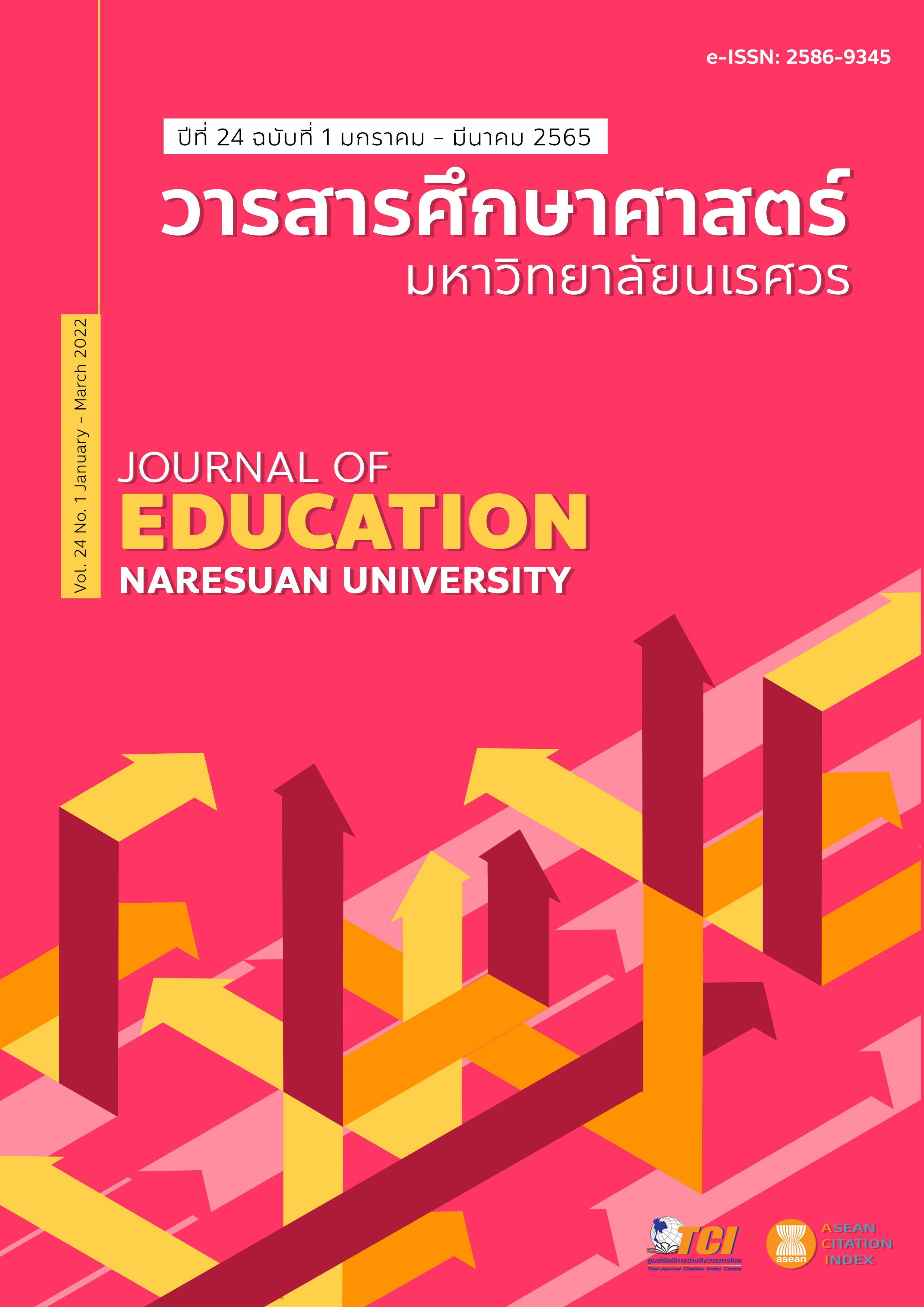THE EFFECTS OF MATHEMATICS LEARNING ACTIVITIES BASED ON MATHEMATICAL ARGUMENTATION MODEL ON MATHEMATICAL REASONING ABILITY OF GRADE 5 STUDENTS ผลของการจัดกิจกรรมการเรียนรู้คณิตศาสตร์โดยใช้รูปแบบการโต้แย้งทางคณิตศาสตร์ที่มีผลต่อความสามารถในการให้เหตุผลทางคณิตศาสตร์ ของนักเรียนชั้นประถมศึกษาปีที่ 5
Main Article Content
Abstract
This research objective is to study the effects of learning implementation based on mathematical argumentation models on mathematical reasoning ability in quadrilateral topic of grade 5 students. The target group of the research are 9 students grade 5 in second semester, 2019 academic year, from a small school in Nakhon Sawan province. The classroom action research was 4 cycles of PAOR for 12 hours. The research instruments were 4 lesson plans, worksheets, test of mathematical reasoning ability and interview. The data were analyzed by content analysis and checking the reliability of the data by methodological triangulation. The results from worksheets showed that students can develop their reasoning ability in the conclusion of problems more than justify the reasoning of a conclusion in descending order. While the mathematical reasoning test show that most students can draw conclusions about problems higher than consider the reasoning of conclusions.
Article Details

This work is licensed under a Creative Commons Attribution-NonCommercial-NoDerivatives 4.0 International License.
The owner of the article does not copy or violate any of its copyright. If any copyright infringement occurs or prosecution, in any case, the Editorial Board is not involved in all the rights to the owner of the article to be performed.
References
Hiebert, J., Stigler, J., Jennifer, K. W., Jacobs, Givvin, B. K., Garnier, H., Smith, M., Hollingsworth, H., Manaster, A., Wearne, D., & Gallimore, R. (2005). Mathematics teaching in the United States today (and tomorrow): results from the TIMSS 1999 video study. American Educational Research Association, 27(2), 111-132.
Kijkuakul, S. (2014). Learning science directions for teachers in the 21st century. Phetchabun: Juldiskarnpim. [in Thai]
Knudsen, J., Stevens, H., Meloy, T., Kim, H., & Shechtman, N. (2018). Mathematical Argumentation in Middle School–The What, Why, and How. California: Corwin.
Makanong, A. (2010). Mathematical Skills and Processes: The development of development skill. Bangkok: Chulalongkorn University Press. [in Thai]
Ministry of Education. (2017). Indicators and core curriculum for mathematics learning (revised B.E. 2560) Basic education core curriculum BE 2551. Bangkok: The Agricultural Co-operative Federation of Thailand. [in Thai]
National Council of Teachers of Mathematics. (2000). Principle and standards for school mathematics. Reston, Virginia: National Council of Teacher of Mathematics.
O’Daffer, P. G., & Thornquist, B. A. (1993). Critical thinking mathematical reasoning and proof. In Patricia S. Wilson (Ed.), Research ideas for the classroom: High school mathematics (pp. 39-56). New York: Macmillan Publishing Company.
Office of the Education Council. (2011). A guide to building knowledge and understanding for director teachers and students to prepare for assessment according to the International Research Project (PISA and TIMSS). Bangkok: Prikwan Graphic. [in Thai]
Rumsey, C., & Langrall, C. W. (2016). Promoting mathematical argumentation. Teaching Children Mathematics, 22(7), 412–419.
The Institute for the Promotion of Teaching Science and Technology. (2012). mathematical skills and processes. Bangkok: 3QMedia Company. [in Thai]
The institute for the Promotion of Teaching Science and Technology. (2017). Research Report of TIMSS 2015. Retrieved August 12, 2019, from http://timssthailand.ipst.ac.th/timss/reports [in Thai]
Warren, E., & Cooper, T. J. (2008). Patterns That Support Early Algebraic Thinking in the Elementary School. In Algebra and Algebraic thinking in school mathematics. Edited by Carole E. G. & Rheta R. USA: National Council of Teachers of Mathematics.
Winaikosol, T., & Noumnom, P. (2019). Effects of organizing mathematics learning activities sing STEIN’s model on mathematical knowledge and reasoning abilities of ninth grade students. An Online Journal of Education, 14(1), 1-16. [in Thai]
Yoosook, W. (2012). Development of mathematical reasoning ability and creativity of tenth grade students using mathematical extra-curricular activities and experiential learning cycle (Master thesis). Bangkok: Chulalongkorn University. [in Thai]


